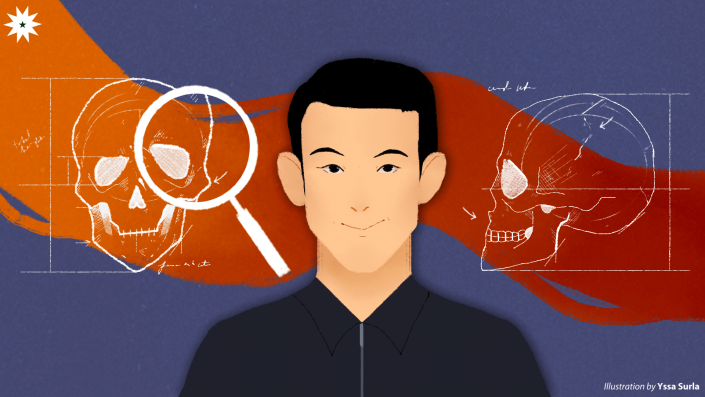Analyzing the past, understanding human relationships, and exploring human behavior are the most common tasks associated with anthropology—the study of human behavior. Branching from this is forensic anthropology, which employs scientific methods and utilizes anthropological knowledge in medicolegal issues.
As such, forensic anthropology is commonly used in the justice system and in applications such as solving criminal cases or identifying bodies from mass fatalities. Thus, investigative methodologies from this field are necessary to provide justice and establish human rights.

Exploring the field
Forensic anthropology is an interdisciplinary field that integrates forensic sciences, physical and cultural anthropology, and archeology to apply medical and forensic knowledge to legal problems. While forensic anthropology traditionally involves working with decomposed or skeletal remains, the field also now delves into the recent dead—and even the living—in areas such as age estimation, trauma evaluation, and face recognition.
Dr. Matthew Go, a Filipino forensic anthropologist working at the United States Department of Defense (DOD), shares his experiences working in the field and his efforts to promote forensic anthropology in the country, where the field is still relatively unknown.
“The Philippines experiences many mass fatalities a year, whether that be in typhoons, earthquakes, mudslides, ferry crashes, airplane crashes, or interpersonal violence like in Marawi (the massacre),” Go says. He explains that the management of the dead in these situations are “skills that can be provided by a forensic anthropologist.”
Earlier this year, Go was also granted diplomate status to the American Board of Forensic Anthropology (ABFA)—the first Filipino diplomate to ever be on the board. Since its establishment in 1977, ABFA has only given diplomate status to 163 forensic anthropologists with exemplary expertise in the field.
Early beginnings
Go recalls how he started his journey into forensic anthropology and archeology during his undergraduate years. While he had initially entered as a pre-medicine college student, he realized he did not see himself pursuing a career in medicine. “I was still really, really interested in biology and human anatomy, and…in how these could be applied in [the] humanitarian sector and human rights fields. I did my research…and that’s how I found anthropology,” he explains.
While the shift from pre-med to anthropology was not difficult in terms of coursework, he was still hesitant to choose an uncommon career path. After switching majors, however, he found that he enjoyed and excelled at his classes and that the fieldwork was fulfilling to work on—that it was something he could see himself doing long-term.
His work in forensic anthropology includes excavating a prehistoric cemetery site in Peru and becoming a visiting scientist with the New York City Office of Chief Medical Examiner. At the DOD, he identifies service members from the military who did not return from war.
For his PhD dissertation, Go focused on the cranial variation of the Filipino population. He studied the morphology of several Filipino skulls and how they are different or similar to other populations around the world. “That difference might help us in [the] identification of unknown individuals, specifically in the estimation of that individual’s sex and ancestry,” he explains.
Growing branches
The field of forensic anthropology in the Philippines is still burgeoning. Currently, only a few universities in the country offer forensic anthropology electives or programs in related fields such as forensic science.
Go mentions that in the Philippines, most casework that should go to forensic anthropologists instead goes to medicolegal officers in the Philippine National Police, who have related but different skill sets. “The country only has one or two people who would be able to call themselves forensic anthropologists, though neither of them is certified by anybody,” he says.
He further elaborates on the small scope of forensic anthropology in the country, defining the field as “quite new, underdeveloped, and really only exists in the academe.” Because of this, he works to promote the field locally despite working abroad.
Go has given talks, webinars, and seminars to universities, government agencies, and non-government agencies and has published research, reviews, and critiques in the journal, Philippines Forensic Anthropology. He would give face-to-face lectures with hands-on materials to students in Manila and Baguio. However, this has changed with the SARS-COV-2 pandemic. “All of my lectures and interviews have just been over Zoom…but I think it might actually be a good thing because the reach has expanded,” he says.
He has also amassed a research collection available for both local and international scholars located in the Philippines, among other efforts in furthering the growth and development of his field.
A blooming field
Go is optimistic about the development and growth of the field in the country, with a rise in interest among Filipino students in pursuing forensic anthropology. “I’ve trained students in the Philippines, and they’ve gone on to do their masters in forensic anthropology and forensic science abroad,” he remarks. “I’m very proud of my students because they were able to find scholarships…that allowed them to pursue forensic anthropology…and their intention now is to bring that education back home.”
When asked about the possibility of pursuing a full career path in forensic anthropology within the country, Go expresses hope for the further expansion of the field in the future. “[The field of forensic anthropology in the Philippines] is certainly growing more than it is receding,” he shares. While he admits the field is not easy to succeed in, he assures that “it’s something that [is] very fulfilling and very worthwhile.”
